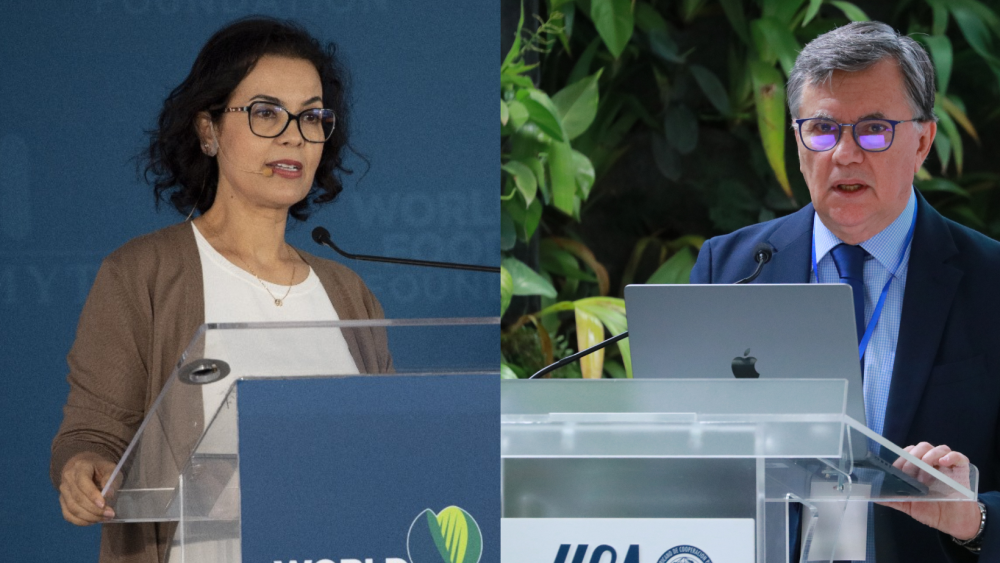The CGIAR, the world’s largest agricultural research network, is to step up joint work with IICA for the transformation of agrifood systems

San José, 22 July 2024 (IICA). The Consultative Group for International Agricultural Research (CGIAR), the world’s largest agricultural research and innovation network, gave a presentation on its work and achievements to the Advisory Council for the Transformation of Agrifood Systems (CATSA) of the Inter-American Institute for Cooperation on Agriculture (IICA), and advocated intensifying the joint efforts of the two organizations.
The Executive Managing Director of CGIAR, Ismahane Elouafi, and the Director General of IICA, Manuel Otero, chaired the virtual meeting. The CGIAR’s Regional Director for Latin America and the Caribbean, Joaquín Lozano, and IICA’s Director of Technical Cooperation, Muhammad Ibrahim, also took part.
With more than 50 years of experience, the CGIAR produces scientific evidence for decisionmakers and new tools for its partners designed to transform agrifood systems and facilitate better economic, environmental and nutritional use of agriculture in low- and middle-income countries.
The CATSA is a group of experts brought together by IICA, all of whom have made major contributions to the agrifood sector working in the public, private and academic spheres, seeking solutions to the challenges faced by agrifood systems. Special guests representing organizations working within agricultural and food systems also participated in this session of the Council.
Elouafi pointed out that the joint mission is to raise agricultural productivity without increasing land use, part of which means bringing technology and innovation to small farmers.
“We need to do things better, engage in smarter production, and to achieve that we want to work closer to IICA in the area of agricultural research. And for our research to have a real impact, all our recommendations must be based on evidence,” said Elouafi, who has served on numerous expert panels and advisory groups, and was a member of the Scientific Group for the UN Food Systems Summit 2021.
The expert acknowledged that in recent years the gap between science and development has widened, and that obstacles must be overcome to bring technology and innovation to the market.
Elouafi gave figures highlighting CGIAR’s achievements in Africa, which have benefited small farmers by increasing their productivity and resilience, noting that that region was a priority.
Otero suggested that Latin America can make an important contribution to Africa’s agricultural development and informed the meeting that IICA was making efforts in that regard. Last May, IICA and the Alliance for a Green Revolution in Africa (AGRA) launched the joint, bi-regional “Living Soils” initiative. Having proven to be effective in the Americas, it will now be applied to restore degraded lands and improve climate resilience in African agrifood systems.
Work and research agenda
The Executive Managing Director explained that the CGIAR intends to intensify its partnership with IICA with a view to undertaking further joint work to strengthen and transform agrifood systems. The aim will be to identify new technological public goods in order to develop a work and research agenda that involves national institutions and organizations and the private sector.
The international organization also promotes joint work with IICA to seek financing for agricultural innovation in the Americas.
Lozano then gave details of the projects in Latin America and the Caribbean, where, he said, progress had been made in moving from research to action and policy design. He highlighted the progress of the Avanzar2030 Project, which seeks to identify scalable innovative agricultural ventures, led by IICA and the International Food Policy Research Institute (IFPRI) and more than 20 other partners.
“Latin America is a region that possesses many of the possible solutions to global challenges, but we also have to address the constraints that exist, such as climate risks that threaten people’s lives,” Lozano said. He emphasized that the Americas is an important partner for the CGIAR, both the countries themselves and IICA and other international organizations, and stressed that they seek to implement programs with a strong impact on agrifood systems.
“Although we have the largest reserves of biodiversity, arable land and fresh water, forest degradation is also a risk,” he added.
In bringing the meeting to a conclusion, Otero remarked that the CGIAR and the IICA intend to build on the complementary opportunities available to them. “We intend to create a much more symbiotic, synergistic relationship that will enable us to build bridges and focus on farmers and rural areas from a sustainable development perspective. The regional dialogue will continue, with a roadmap, with everything clearly signposted, so we all know where to move forward. We need to be linked at the international level.”
More information:
Institutional Communication Division.
comunicacion.institucional@iica.int